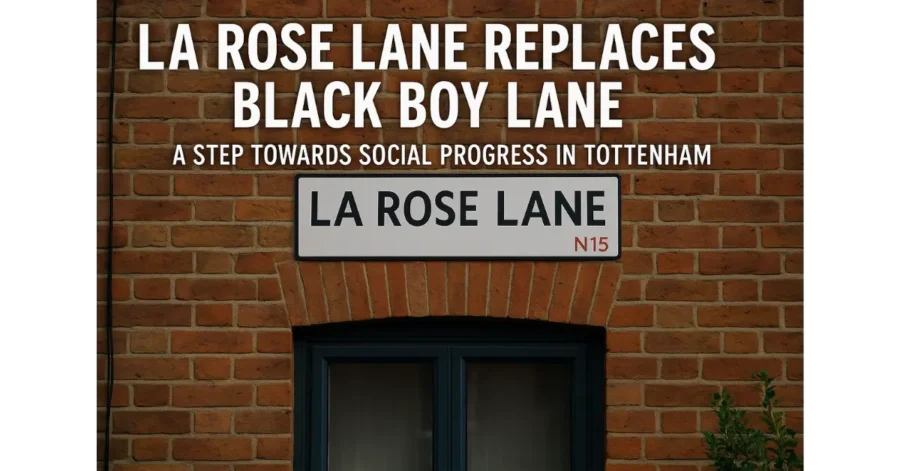
La Rose Lane Replaces Black Boy Lane – A Step Towards Social Progress in Tottenham
Imagine living on Black Boy Lane and waking up one day to find it called La Rose Lane. That’s exactly what happened in Tottenham when Haringey Council officially changed the name, honoring John La Rose, a remarkable Black publisher, poet, and activist. This shift wasn’t about convenience—it’s rooted in history, civil rights, and anti-racism UK efforts. But not everyone welcomed change, sparking debates over identity, heritage, and progress.
Why the Name Changed – Understanding the Background
From Black Boy Lane to La Rose Lane
In December 2022, after public consultations following the global anti-racism protests of 2020, Haringey Council announced that Black Boy Lane would be renamed La Rose Lane—effective 23 January 2023—honoring the impactful legacy of John La Rose, a pioneer for Black heritage commemoration in the UK. The council clarified this followed concerns that the old name had racist connotations and caused hurt to Black residents and visitors. Signs were updated but included “(formerly Black Boy Lane)” during a transition period to ease disruption.
Who Was John La Rose?
John La Rose’s legacy demands attention. Arriving from Trinidad in 1961, he founded New Beacon Books in 1966—the first specialist Caribbean publishing house in Britain—and co-founded the Caribbean Artists Movement. La Rose played a key role in the civil rights movement, co-founding the Black Parents Movement and leading grassroots initiatives advocating for Black education and rights in the UK.
Community Reactions – Unity, Division, Dialogue
Support for the Change
Renaldo La Rose, John’s grandson, called the renaming a “beautiful thing,” giving tangible visibility to his grandfather’s enduring impact. Local activists and Black community leaders widely saw the move as overdue recognition for a valuable cultural and political figure.
Resistance and Concerns
Not everyone agreed. Some residents viewed the original name as part of heritage—or benign—with origins tied to a 17th-century pub or folklore. Opposition voiced concerns over government overreach, costs billed at around £185,000–£186,000, and potential disruption to daily life. Residents even placed “Black Boy Lane” signs in protest, while critics labeled the move as a “performative display of virtuousness.”
Forum comments echoed that viewpoint—suggesting, for example, the phrase might refer to chimney sweeps or King Charles II’s complexion, rather than racial insensitivity.
A Name Vandalized – What It Revealed
Vandalism Sparks More Debate
Less than 24 hours after unveiling the new street sign, one was defaced with black spray paint. Soon after, a large “Black Boy Lane” poster appeared behind it—both acts symbolizing tension over history and progress.
Council leader Peray Ahmet condemned these “mindless acts of vandalism,” calling them a harmful distraction from honoring La Rose’s legacy. She defended the decision-making process, which included multiple consultations and a voluntary £300 payment to each affected household to ease the transition.
A Broader Conversation: Street Name Racism and Social Progress
Public Consultation and Decision Making
The name change came after a broad consultation, initiated after the George Floyd protests in 2020. The Corporate Committee weighed resident voices and past concerns. Though some strongly opposed, supporters argued that “La Rose Lane makes visible a political history few people will know about because it has been rendered invisible.”
Street Name Racism – Not an Isolated Case
Tottenham isn’t the only place grappling with symbolic legacies. London has seen several streets and buildings renamed in response to historical ties to the transatlantic slave trade—highlighting a growing push in the UK for racial equality and accountable public memory.
Two Perspectives, One Goal
Here are two ways to understand this renaming:
- Honoring Black heritage
- By naming the street after John La Rose, the community commemorates a local figure who fought racism, nurtured culture, and built institutions for future generations.
- Concerns about erasing heritage
- Long-time residents argue the original name reflected local history unrelated to race, and see the change as imposed, costly, and symbolic rather than substantial.
Both views express a deep connection to place and history; neither wants erasure, but they define progress differently.
What This Means for Racial Equality in the UK
- Visible Representation: Commemorating Black figures like La Rose signals a shift in public memory—embedding Black excellence into everyday communities.
- Pattern of Renaming: As London reckons with colonial legacies, renaming becomes one way to reshape cultural landscapes.
- Policy Implications: Haringey’s process might inspire other councils to review street names impacting racial equality and broader social progress.
Conclusion: A Street Renamed, a Dialogue Renewed
The transition from Black Boy Lane to La Rose Lane is more than a new sign—it’s a symbol of evolving values, cultural acknowledgement, and respectful remembrance. While some residents cling to old names out of comfort or tradition, the broader legacy of John La Rose now lives in the neighborhood in a meaningful, visible way.
This change invites deeper conversation about how cities honor histories, uplift underrepresented figures, and balance respect for heritage with the need for inclusive progress. Tottenham may never see eye to eye on every detail—but La Rose Lane stands as a hopeful landmark in the ongoing journey toward racial equality UK.
If you’d like, I can develop an accompanying guide to other UK street renaming efforts or profiles of figures similarly commemorated across London. Just let me know!

